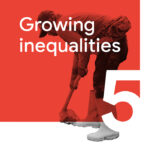15 Jul
Introduction
- Reservation was introduced as a part of affirmative action for uplifting socially and educationally backward
- The reservation for SC and ST is mentioned in constitution
- Reservation for Other Backward Class started from Mandal commission recommendation in the year
- The 103rd Constitutional Amendment Act was passed in 2019 to bring economically weaker sections of general category under the purview of
- SC and ST are considered socially and educationally backward irrespective of economic status and everyone belonging to those groups are eligible to get reservation under Article 16 or any provision made under Article
- In case of OBC, reservation can only be availed if they belong to Non-Creamy layer (NCL) i.e. economically weaker with an annual income of less than 8
In 103rd Constitutional Amendment, Article 15 and Article 16 were amended and thereby, along with the socially and educationally backward classes, government can provide some affirmative action both in terms of policy educational institutions, and public employment for Economically weaker section of general category.
Can the economically weaker general section be added to SC, ST or OBC category?
- In 2014, Congress government included Jatts under It was struck down by Supreme court stating that there is no proper backwardness.
- Reservation can only be given on social and educational
- Later the constitution was amended to include educational backwardness as a criteria for affirmative
- It is difficult to analyze the backwardness of
- Overall social and educational state of the caste will be considered rather than the So, an average well-being of caste will affect individuals.
RELATED CONCERNS:
- Constitution amendment power of Parliament is limited it is not Amendment cannot affect the basic structure of constitution.
- In 1973 Kesavananda Bharati Case, the Basic Structure Doctrine was
- If the amendment affects the basic structure, it will be regarded invalid and SC will strike down the
Why EWS reservation needs to be struck down?
- In Indira Sawhney of 1962 and Ram Singh Case, SC ruling was that the total reservation in country should not be more than 50%.
- Under 103rd Constitutional Amendment, EWS reservation up to 10% is permitted. Now reservation is beyond 50 percentage which is a violation of SC
- It is against basic structure that it violates the principle of equality by providing reservation to general section who are not socially or educationally backward and by breaching the 50% limit of
- To bring equality, social and educational backwardness is
- Later realized that economic backwardness is also creating inequality and is to be addressed. What if other new criteria like regional inequality are raised in future for reservation.
- Which inequality is to be considered is the question and concern is on whether we are heading to equality or
- For General category to come under EWS category, annual income must be less than 8 For OBC NCL also, income ceiling is 8 lakhs.
- Here, OBC candidate’s backwardness is made equal to that of forward class and now OBC and General category came to the same level. For instance, in UPSC Exam also cutoff of EWS is lower than OBC.
- The Supreme Court questioned the rationale behind fixing the income ceiling for EWS
- No Urban and rural difference in criteria which is a type of
- To reconsider the rationale behind fixing the income ceiling for EWS, the Ministry of social justice constituted a 3-member
WAY FORWARD
- There is a need to consider some other innovative approach to bring about equality other than
- It will be possible enough to bridge every type of inequality and thereby help in attaining inclusive development in a long
Question
Extending Reservation System to many will make this whole system futile. Do you agree?
(250 Words, 15 Marks)


